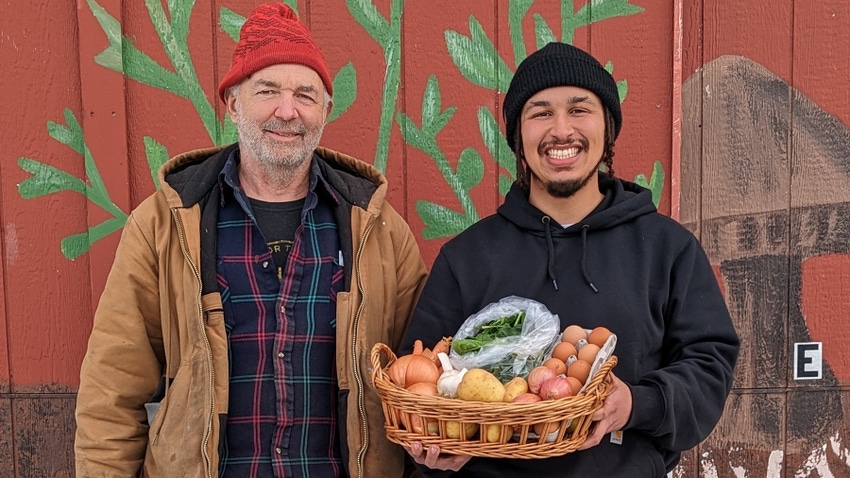
This story is part of yearlong series in 2023 focusing on efforts to attract new people into the agriculture industry and the outreach that’s being done to educate youth on its many opportunities.
Smack dab in the middle of the recession in 2010, 16-year-old Alex Ball was getting concerned about his community. People were losing their jobs and their homes. The local grocery store closed, and food insecurity was becoming real, not only from a financial perspective, but also because of lack of availability.
Local food production intrigued him, although he had no experience or family ties to it. So, he turned to YouTube, where he saw a video about backyard farming, which sparked his drive to become a first-generation farmer.
Getting started in farming can be rewarding, but also challenging. It’s hard enough for sons and daughters to take over from their parents. It’s exponentially harder for someone without a farming background to break into the business. Starting a new agricultural operation can be an intensive and expensive endeavor.
Connecting experienced farmers with beginning farmers in a mentor-mentee relationship is one way to transfer institutional knowledge, while providing networking and insight.
The industry needs new blood, as the average age of the U.S. farmer is about 57.5 years, according to the last U.S. census (2017). Those older than 65 — the largest segment of producers and the largest controllers of land — are expected to retire and exit production in the next several years.
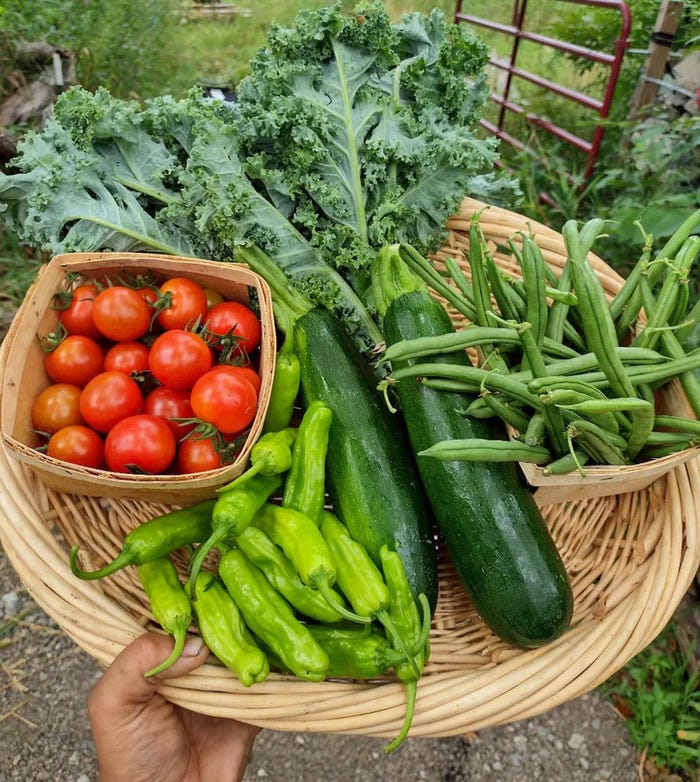
FRESH OFFERINGS: Alex Ball’s Old City Acres Farm in Belleville, Mich., is supplying about 100 Community Supported Agriculture boxes with fresh vegetables for customers in the area.
There are many obstacles in the way — including capital-intense startup costs, increasing land prices, access to land, business planning and startup down payments.
However, there are resources in every state designed to attract new interest and tools to help new farmers be successful.
One program in Michigan offered by GreenStone Farm Credit Services, CultivateGrowth, offers three areas of assistance: grants for educational opportunities, guaranteed loans with relaxed underwriting and incentives to reduce the interest rate, and a mentorship program.
All are designed to aid young, beginning and small farmers with challenges. “The goal is to help support the next generation of agriculture, to increase diversity and to help the next cohort of farmers and industry leaders overcome a lot of common challenges in agriculture,” says Amber Echlin, public relations specialist for GreenStone assisting with CultivateGrowth. “The program is designed to give them resources and tools to make their mark in agriculture and overcome the first several years of hardships because it's very tough to get started.”
An experienced farmer may offer insights on financials, government programs, records, crop rotation, conservation practices, soil fertility, marketing, pest or disease issues, and more.
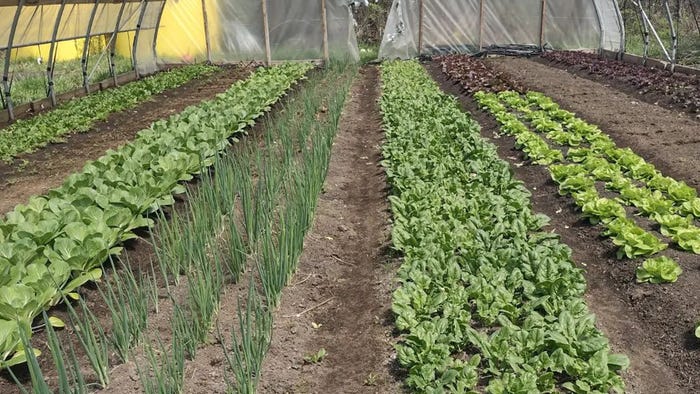
FULL POLYTUNNEL: Crops are growing nicely in one of five tunnels Alex Ball has on his 2-acre property in Belleville, Mich.
It is a program that participants can stay in for a while, as they learn and develop and expand their operation with three requirements for eligibility:
A young farmer is one who is age 35 or younger.
A beginning farmer is one who has 10 or fewer years of experience.
A small farmer is one who generates less than $250,000 in annual gross sales from production agriculture.
The 18-month program is free for GreenStone members and includes luncheons at the kickoff and wrap-up meetings, as well as portfolios and course materials such as GreenStone’s mentee road-map workbook that offers tips on how to maximize the program.
This fall kicked off the sixth program cycle, and it typically has about 20 participants. It will wrap up in spring 2024, at which time a new recruitment cycle will begin.
“We match mentors and mentees with similar commodities and business goals, who are semi-local,” Echlin says. “We don’t want them to be next-door neighbors, but we also want them to be close enough they can easily meet, as well as talk about current topics in their county or area.”
Mentors and mentees are encouraged to meet and talk whenever they want. Quarterly meetings with a GreenStone loan officer help ensure everyone is on track.
Alex Ball’s story
“I really had nothing when I started,” Ball says. Over a year was spent researching before he started renting backyards from people where he could develop small gardens and sell vegetables in the summer while studying business in college. Looking back at getting started, he doesn’t mince words.
“It was miserable. I did that for a about five years, but I kept losing land and bouncing around properties,” he says. “I wanted to buy some property, but it was so expensive, prohibitively expensive. And, as a 20-something, no one wants to lend money to someone with no real equity.”
He had a website and a solid business and marketing plan. The quest was on to find property near his marketing destinations of Ypsilanti (south of Detroit), Belleville and Ann Arbor communities.
“To build a long-term return on a farm business, you need the land,” he says. “I looked at over 100 properties driving around back roads. There’s some really good farmland in Washtenaw County, but prices are just over the top.”
What Ball lacked in cash, he made up for with his business sense by keeping solid records of his backyard operations. Years of tax and historical sales records backed his proof of concept when he eventually approached GreenStone Farm Credit Services for a loan on property in Belleville.
In 2017, at 22 years old, he bought what he could afford, which was 2 acres in Sumpter Township for $14,000. “It wasn’t the best ground — very wet,” he says. “The land was literally a forest. It took three months to clear a quarter-acre, and through the years I’ve invested more than $120,000 in farm development. There’s been a lot of ditch-digging, drainage of the property and building greenhouses.”
He’s now growing about 20 different salad crops such as tomatoes, peppers, cucumbers, kale, carrots, radishes, zucchini and more — selling at different outlets such as farmers markets, restaurants, local grocery stores and his own Community Supported Agriculture program.
He signed up for CultivateGrowth and was paired with Mike Fusilier, a commercial vegetable grower in Chelsea, about three years ago.
“It was a great opportunity to learn and see a totally different scale of operation than I was accustomed to,” Ball says. “It really helped broaden my horizons.”
Ball now has two businesses, the farm Old City Acres and an online marketplace in the form of a flexible CSA. It’s a flexible CSA because customers can buy in at a set rate and then establish a bank account of credits to buy vegetables and other local foods they pick out and then designate when it’s delivered or picked up, unlike the more traditional CSA where there is a set fee and a standard box of goods delivered weekly.
Ball liked the communication and networking so well with Fusilier that he wanted to continue and signed up for another mentorship. This time, he was paired with Tantre Farms owner Richard Andres, who started farming 40 acres in Chelsea 30 years ago and has grown it to 300 acres, growing vegetables and fruit.
“I started as a CSA produce farm, expanded into milk shares, and now we're doing produce, beef, a few hogs, chickens with egg production, flowers and mushrooms,” says Andres, who notes that he sold off the milk-share business a few years ago. “We also have a 5-acre mushroom fruiting yard in the woods. Our emphasis is on four-season growing with greenhouse hoophouses and a root cellar.”
A few years ago, he bought some acreage in Ann Arbor. “We've always been trying to move closer to the Ann Arbor area because most of our members are there,” Andres says.
Andres created a regional CSA with about 375 members, distributing mainly to Plymouth, Ann Arbor and Chelsea. The regional CSA does not serve Ypsilanti, which created great opportunity for Ball.
Through the CultivateGrowth mentorship, they rode together to the initial group meeting in Lansing last November. The idea was to meet and share their stories, but the drive there was a full preamble of nonstop discussion and idea sharing.
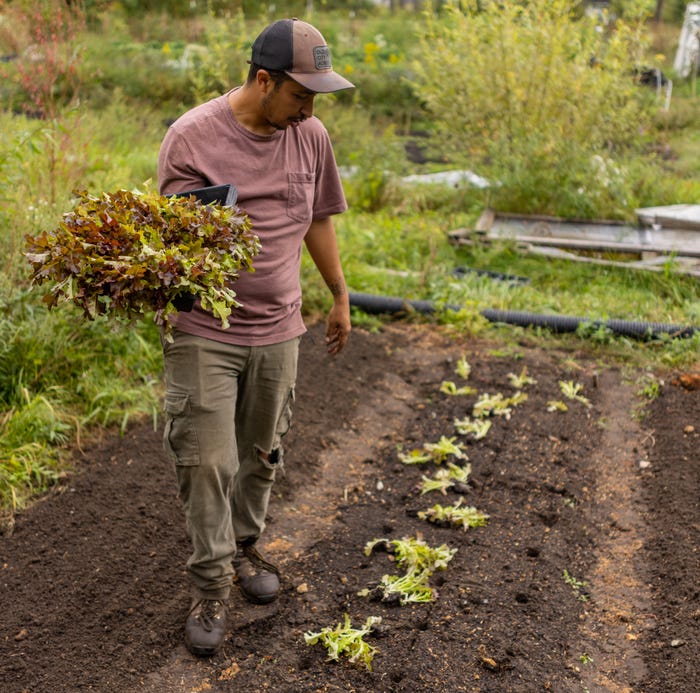
LETTUCE HARVEST: Alex Ball harvests some of the many varieties of greens grown on the Old City Acres Farm.
“He’s unique, intelligent and he’s really developed something there, as that area needs access to the fresh CSA model,” Andres says.
Having dialogs with young people is something Andres and his wife, Deb Lentze — a former teacher — enjoy doing.
“I enjoy the beginner’s mind and young people who are enthusiastic and idealistic and want to make a difference in this world,” says Andres, who just turned 60. “That is something that feeds me right back. I love to talk about what we do, why we do it and its importance. When I meet somebody sincere like Alex, it helps me develop my synthesis of thinking. He may learn something; I know I still have a lot to learn.”
Growth ahead
In the summer, most everything in the Ball’s CSA box is sourced from his Old City Acres Farm, except for eggs and bread. It dips to about 75% in the winter months.
While Ball wants to continue to be a major supplier to the CSA, he also is working with other farmers in the area to offer their crops. As the 100-customer business grows — with a goal of 250 by 2025 — it allows him to meet customer needs while concentrating on the farm crops he produces well with the greatest profit margin. “And all the products are labeled so customers know where it was sourced,” Ball says.
In addition to field crops, he has one 30-by-50-foot double polytunnel, and four 15-by-100-foot tunnels, which can be used year-round.
“I’ve invested a lot of time and money to develop systems to handle this growth and make it profitable,” Ball says. “It’s a year-round business, and I’ve got data on consumer purchases from week to week, and so I have all that data to help predict demand.”
For the past five years, the business has been growing by 15% to 25% every year.
On Saturday mornings Ball sells about 10% of the farm’s production annually at the Ypsilanti Depot Town Market, May through October. “Customers can use their credits at the market too,” he adds.
As his marketing business grows, Ball says relationship building has been a key to advancing. “Moving more to a hybrid business and buying more local products, I have to build deeper connections and Richard has really helped with that,” he says. “We grow in similar climates, sell to similar markets and in similar areas. The mentorship provides someone you can learn from, someone you can bounce ideas off, and we each can learn something.”
Andres has only been involved with CultivateGrowth since last fall, but he started an internship program on the farm 20 years ago.
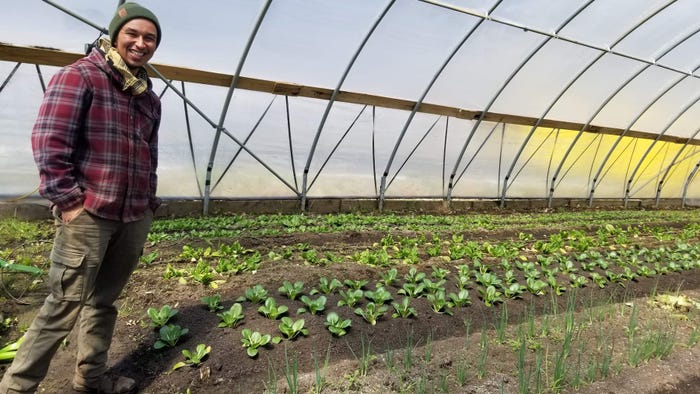
MISSION: Alex Ball has been on a mission to be a first-generation farmer since he was 16.
Although not in the school system any longer, “My wife is always mentoring and teaching,” he says.
The farm hosts about a dozen school groups a year. “She's a ‘people person’ and loves to engage people,” Andres says. “It’s not a formal classroom, but she's still a teacher on a lot of different levels here.”
Several people live and farm on the property, while sharing resources. “We have anywhere from six to 22 people every year,” Andres says. “In the summer, we cook together and have a big communal meal at lunchtime. We usually take on people who have never farmed before or who have an interest in learning.”
He’s helped a migrant family from Texas work on the farm and then assist in getting their own farm. Now, they share resources and markets. “It's taking care of each other and taking care of the Earth,” he says.
Andres says he’s impressed with Ball’s knowledge and use of technology with podcasts, as well as data collection and tracking margins. “We've had some really long, engaging conversations,” he says. “He has great ambition.”
There may come a day when Ball will be asked to be a mentor. “That’s great,” he says, “but it really doesn’t matter what the title is. It’s about the relationship, the connection, finding someone with similar values and sharing your knowledge.”
About the Author(s)
You May Also Like






